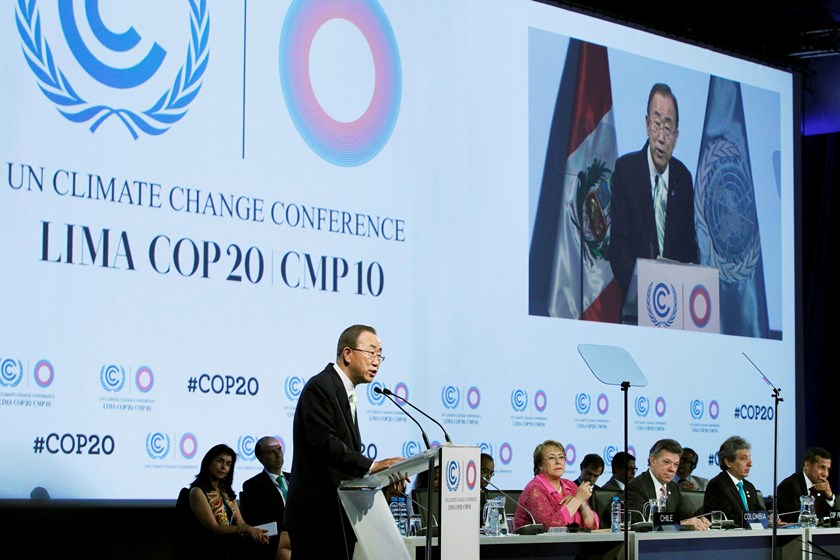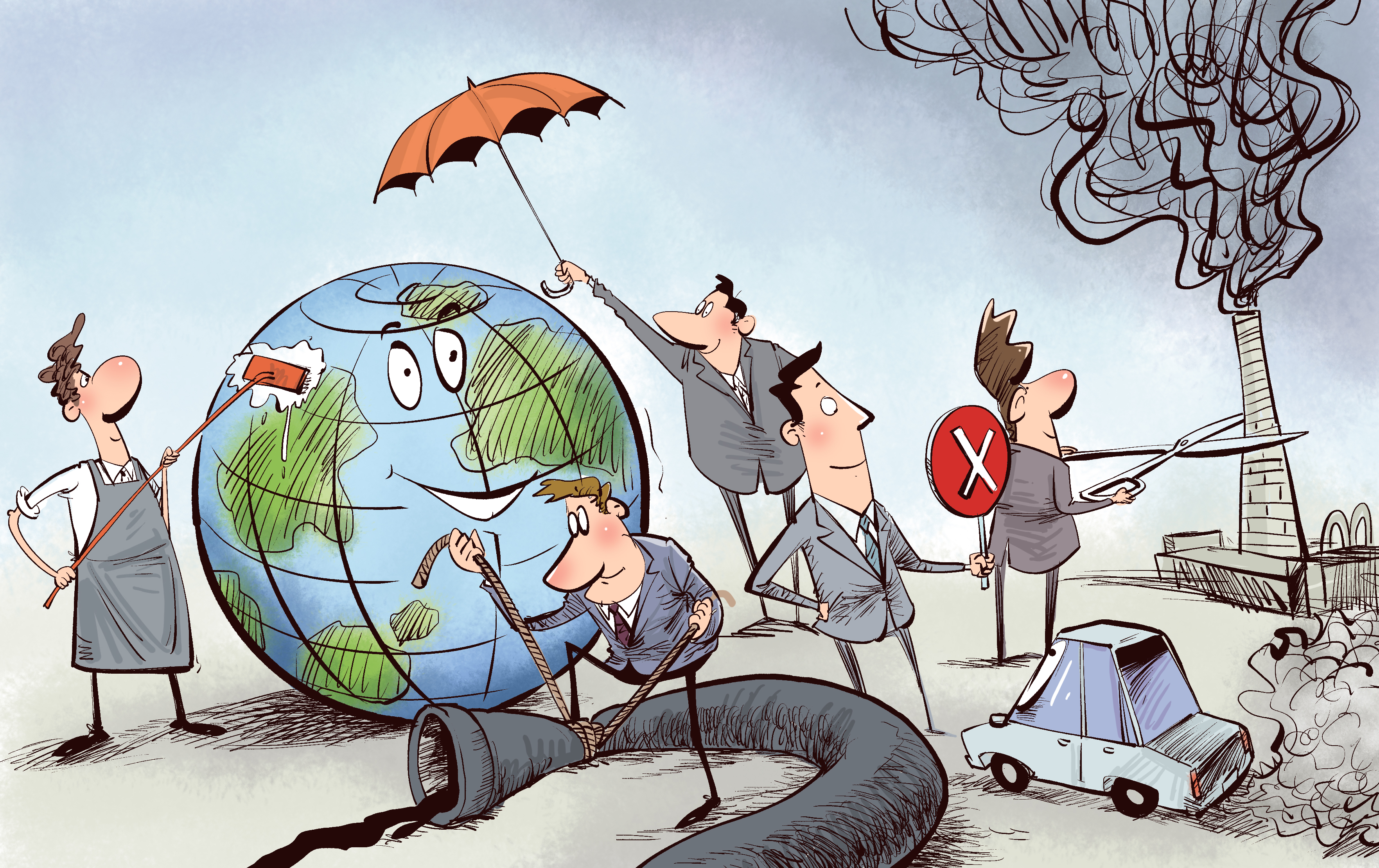Emerging powers can expand clout through issue alliances

United Nations Secretary-General Ban Ki-moon delivers a speech at the UN Climate Change Conference COP 20 in Lima on Dec. 10, 2014. Nearly 200 countries agreed on a plan, known as the Lima Call for Climate Action, to fight global warming, and committed themselves to cutting greenhouse gas emissions.

An issue alliance is an alliance of various interest states and institutions who unite in order to promote a single issue in the international arena.
As the world struggles to regain its footing in the wake of the financial crisis, nation-states across the globe and international organizations are vying for dominance in the realm of global governance. In a contest that will profoundly shape the world to come, the established powers have a relatively huge edge over the emerging powers because of their comprehensive strengths, international status and control of international norms, but the gap is closing as emerging powers gain prestige and influence in the global governance regimes.
Weak soft power
Though rising powers are on the track toward building their international clout, some uncertainties remain. First, emerging powers have seen slow economic growth. Though emerging powers, particularly China, have astonished observers with their fast economic growth in the past few years, the internal and external factors that have supported such rapid growth in these countries are special, circumstantial, and to a large extent, unduplicable.
The UN World Economic Situation and Prospects 2011 report recognized China and India as important engines for driving the world economic recovery. However, it also pointed out that the growth outlook has been tempered by several pressing concerns, including rising inflation, domestic asset price bubbles, upward pressure on exchange rates and large capital inflows. A slowdown is inevitable if emerging economies cannot properly tackle these problems through measures like accelerating restructuring.
A series of authoritative statistics have confirmed such an assertion. The next concern is emerging powers will lose momentum if slow economic growth becomes the norm or severe stagnation occurs.
Second, the soft power of emerging economies is unlikely to improve significantly in the short term. Historical experience and theoretical studies have shown that the rise of states in the world system is based on the enhancement of comprehensive strength, status and influence rather than unbalanced growth in economic power, status and influence. In other words, without the rise of political and cultural power, or soft power per se, the economic rise will be unstable and unsustainable.
Studies show that the soft power of emerging economies is relatively weak, even for China with its long history and splendid culture. Many Western scholars believe that China’s efforts to disseminate its culture and values have not been as successful as expected.
Although all emerging powers, including China, have more or less recognized their shortcomings while making great strides to change the status quo domestically and internationally, it is difficult to see fundamental improvement in the near future, given that these countries are confined by insufficient hard power as well as historical, institutional and cultural constraints.
Therefore, it is safe to say that it will be a long time before emerging powers can fulfill their vision of becoming effective participants in global governance. They must first constantly improve their international status, influence and indeed, their weak national strength.
In order to consolidate the gains and increase influence over global governance, emerging powers should focus on the bigger picture while coming up with more effective means to strengthen their power, one of which is building issue alliances.
Flexibility
An issue alliance refers to a voluntary partnership formed by international actors who share the same or similar interest in a particular transnational issue. International actors can be either states or non-state bodies, including international intergovernmental organizations, non-governmental organizations and transnational social groups.
An issue alliance is a new format of alliance. It has some features in common with traditional political or security alliances because it can unite multiple parties regardless of region, political system, ideology or socioeconomic status, but there are also many differences.
First, an issue alliance mainly concerns matters that fall under the mantle of low politics, such as environment and climate change, trade and investment, as well as network and information security. These issues are relevant to a state’s welfare, but not to core national interests, so it is easier to reach a consensus on them. By contrast, traditional alliances involving politics and security usually fall into the category of high politics.
Stephen Walt, one of the main researchers in the area of alliances, defined an alliance as “a formal or informal relationship for security cooperation between two or more sovereign states” in his book Origins of Alliances. It is obvious that security here refers to alliances in the traditional sense. Because traditional security issues are closely tied to core national interests, international agreement is not easily achieved.
Second, an issue alliance does not require formal international instruments, so it is rather flexible. Though a traditional alliance may also be informal, it is mostly a formal interstate relation. As Walt wrote in his book, the United States and Israel have never had an alliance by formal treaty, but there is no doubt they share obligations. Similarly, the Soviet Union and Egypt did not sign a formal treaty until 1971, but apparently, they were close allies.
However, in most cases, traditional alliances are built upon international instruments recognized by all member states and their national legislatures. For example, the North Atlantic Treaty Organization (NATO) has the North Atlantic Treaty, while the Association of Southeast Asian Nations (ASEAN) has the Bangkok Declaration. In general, it takes a huge amount of time, administrative and opportunity costs to form and sustain a traditional alliance.
An issue alliance, on the other hand, usually comes into being through bilateral talks, oral promises and real actions. However, it can hardly exercise any binding force on members, thus requiring little time, administrative and opportunity costs.
Third, issue alliances are established based on mutual trust, but generally the trust level is low. Trust is of vital importance for the formation and maintenance of an alliance. From the perspective of instrumental value, trust can ease the concerns of speculation, which in return forms a positive expectation about the future stability of the relationship among members.
Generally speaking, traditional alliances have a relatively high degree of mutual trust, so they are more stable and last for a prolonged period of time. For example, traditional alliances, such as NATO and the US-Japan alliance, have been in existence for more than half a century and they are unlikely to disband in the short term.
In the meantime, trust among issue alliance members is sometimes tentative, which will naturally affect the stability, so this type of alliance often does not exist for long.
Possible transformation
Finally, it is possible that an issue alliance can segue into a traditional one. The prerequisite is that members share the same or similar interest or faith on specific issues. If temporary interests are further expanded or reinforced, a transformation might take place or they may adopt other stable forms of organization.
Mostly, members of one issue alliance may disagree with each other in other subjects of interest or even take a completely opposite stance, which in turn can lead to evident disagreements and contradictions, even fierce confrontations. For example, Brazil and China have the common goal to increase the share of emerging economies in the International Monetary Fund and the World Bank. They are both BRICS nations and have converging interest in many areas of global governance. However, on the matter of the RMB exchange rate, Brazil and the US take the same side, and they once teamed up to pressure China.
The US hopes to develop Brazil as a new ally that can act as a go-between for the US and the South American countries. Meanwhile, Brazil wants to reduce upward pressure on its currency, stimulate economic growth and gain US support for becoming a permanent member of the UN Security Council.
In conclusion, in the era of globalization, growing interdependence among states has made global governance more and more difficult. It is nearly impossible for any single state to handle the task alone. Though the concept of an issue alliance may have its flaws, it serves as an important way for emerging powers to participate in global governance as well as an effective means to expand their national power.
Wang Cungang is the director of the International Relations and Global Issues Institute at Tianjin Normal University.
